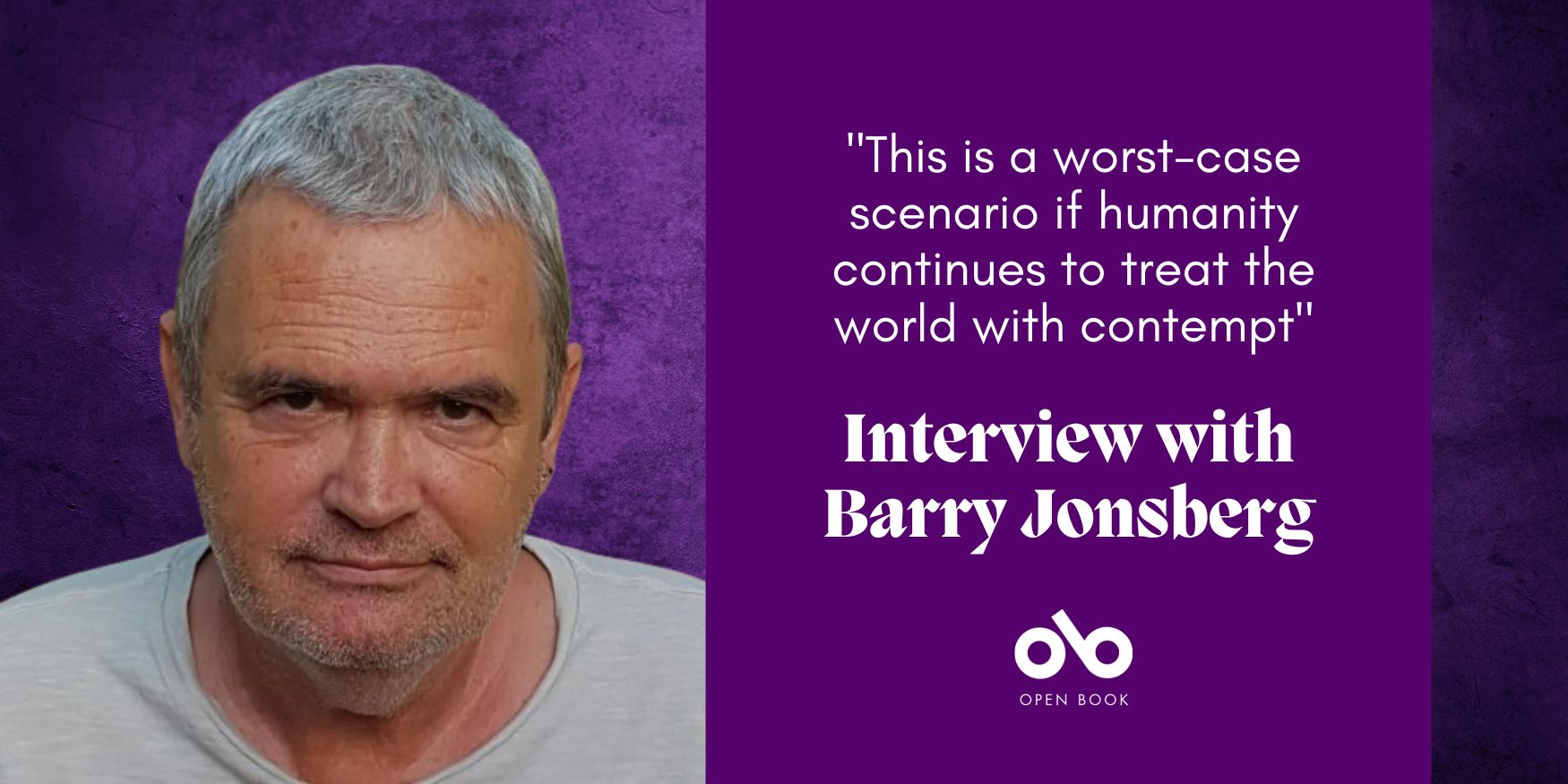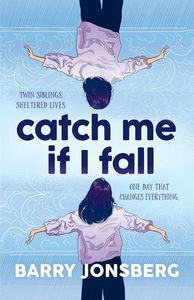"Anyone Who Writes Fiction is a Kind of Magician" Barry Jonsberg on His Writing Process & New Climate Disaster Novel
For twins Ashleigh and Aiden, the world is good. They've always been completely in sync and to them, life seems sunny and happy. But everything changes when Aiden starts behaving strangely after an accident on a school trip, and they slowly come to learn that the protected bubble they live in is nothing like the real world.
Barry Jonsberg's middle grade novel Catch Me If I Fall (Groundwood Books) is set in a near future Australia that has been ravaged by environmental disaster and climate change. Ashleigh and Aiden, beloved children of the richest woman in their state, have been blissfully insulated from reality, and when they discover the truth, everything they know and love is put to the test – including the bond they share and have always considered unbreakable.
Complex and insightful, written with urgency and raw truthfulness, Catch Me If I Fall is climatic storytelling for our age of climate anxiety, and especially for young readers who have literally grown up under the pall of climate disaster. It's powerfully rooted in memorable characters who come alive on the page. We're speaking with Barry, who is the author of an astonishing 23 novels, about Catch Me If I Fall today.
He tells us about discovering Ashleigh and Aiden's story as he wrote, about his process that involves working entirely offline and towards a daily word count goal, and why "writing is as much about destruction as it is about construction".
Open Book:
Tell us about your new book and how it came to be.
Barry Jonsberg:
My book is called Catch Me If I Fall and depicts an Australia that has been drastically affected by climate change. It’s set in the future, thought this might not be clear to readers at first (it’s written in the first person and the narrator Ashleigh, for obvious reasons, is depicting her present world). But extreme weather events and changes to the social order make it clear fairly early on, I hope, that this is a worst-case scenario if humanity continues to treat the world with contempt.
The story is about Ashleigh and her twin brother Aiden living a privileged life in Sydney, unaware of how other people are forced to survive. But a school camping trip results in a terrible accident to Aiden, the consequences of which have a profound effect on the way she sees the world. He is a changed boy, no longer so protective and uncritical of his sister and his parents. This, in turn, leads to a revelation that will turn her world upside down as a closely guarded family secret is revealed. Nothing will ever be the same again.
The book came about as all my books come about – a simple idea that I explore to see where it takes me. I never have any idea of where the story is going – like readers, I continue to turn pages to find out what’s going to happen.
OB:
What do you need in order to write – in terms of space, food, rituals, writing instruments?
BJ:
All I need is space. I always write in my study, a converted bedroom. It was Stephen King who said that all writers need a place where they settle down to work, somewhere that as soon as you enter tells you “this is where work happens.” I write straight onto a computer, a steam-driven thing with no internet access (keep temptations away) and I try to write at least two thousand words before I stop for the day. This isn’t always possible, but the goal is important. I feel guilty if I don’t hit the target and try to make up for it the following day. In this first stage of writing I try to get the story down while it’s still ‘hot’ in my mind, and don’t worry about editing. All of that comes later. But momentum is the most important thing. Two thousand a day, ten thousand a week and you have a novel, the first draft at least, in a few months. Then the hard work starts, making sure it’s the best it can be before anyone else reads it.
Your CanLit News
Subscribe to Open Book’s newsletter to get local book events, literary content, writing tips, and more in your inbox
If there is any noise about, I put a CD on my computer (yes, I know. Who has cds these days? Well, me as it turns out), stick on headphones, and play that one CD on repeat. I have no idea which CD it is because I don’t listen to it. It just blocks out the normal world and leaves me to the world I’m creating.
OB:
How do you cope with setbacks or tough points during the writing process? Do you have any strategies that are your go-to responses to difficult points in the process?
BJ:
I write through them. Sometimes the story doesn’t seem to be going anywhere and given that I never plan anything, this can be a problem. But in virtually every case, a character will help me out in ways I hadn’t anticipated. I am a firm believer that characters start off by being a ‘peg’ on which to hang an idea but after a time they come alive in some weird way and dictate to me. They make their own decisions and I follow along for the ride. That’s one of the best parts of the writing process, when a character starts breathing on his or her own. I’m constantly surprised by what my characters do and I suppose if I’m surprised there’s a good chance my readers will be as well.
So, just keep writing and most times the problems go away. I mean, if it doesn’t work that’s what the delete key on the computer is for. In many cases writing is as much about destruction as it is about construction. NOBODY gets it right the first time.
OB:
What's your favourite part of the life cycle of a book? The inspiration, writing the first draft, revision, the editorial relationship, promotion and discussing the book, or something else altogether? What's the toughest part?
BJ:
You know, it’s all fun. Every part of it. When I wrote my first book (twenty-three novels ago) I really didn’t like the re-writing and editing process. I sort of felt, ‘hey, I’ve written it. Can’t you stop bothering me about unimportant changes?’ Now, I love the re-writing and the editing because it’s the chance and the duty to make it the very best it can be. Once the book hits the shelves, it’s too late. On the infrequent occasions I read extracts from my first novel I inwardly wince and think that I should have paid more attention to editing because now some of the sentences make me squirm.
As I’ve already said, the hot process of getting the story down is great fun. It’s like an adventure and you have no idea where it’s going to end up. I don’t believe in inspiration, by the way. I think it’s a word some artists use to mystify the whole thing. In fact, writing is just like any other job. It can be tedious sometimes, it can be hard, it can be lonely. But turning up to work is most of the secret. Forget inspiration and generate mental perspiration.
I also like meeting my target audience which I do through school visits and festivals. Most of the time we laugh. Sometimes they ask tricky questions. Sometimes you can’t get a word out of them. But I’ve never had a bad session.
OB:
What are you working on now?
BJ:
I’ve written three novels since Catch Me If I Fall, including one called Smoke and Mirrors that I finished just before Christmas. As always, the idea was a simple one. A teenager who doesn’t bother too much with phones, social media, or indeed anything other than her one obsession: Magic. Not the Harry Potter kind, but the one that makes coins and cards disappear (and almost everything else). She is always working on new tricks, researching old ones and improving her skills. As she says, when other girls were thinking about boyfriends and fashion and social life and all the other things girls are interested in, she was in her bedroom working on sleight of hand. She’s good at magic. She’s not so good on personal relationships.
This book came about because I watched Shin Lim’s performance on Penn and Teller (catch it on YouTube if you haven’t seen it). I’d seen it a few times before and I was always amazed. How did he do that? How does he make the impossible possible? And I thought that a teenager who becomes obsessed with magic would be an interesting character. I also thought that what she does – making people believe the impossible – is something that writers do as well. We use words to trick people into believing something that isn’t real. In a way, anyone who writes fiction is a kind of magician.
I’m pleased with the way the book came out, since in some kind of magical transformation, it also became a story about voluntary assisted dying. Don’t ask me where that came from. I don’t know. It just appeared. Like magic. I guess.
It’s now in the hands of a couple of trusted readers. I’ll probably make a few changes before it goes off to my publishers. I hope they like it as much as I do.
__________________________________________________
Barrt Jonsberg was a high school English teacher in Darwin, Australia, before he began his career as an author. His young-adult novel It’s Not All About YOU, Calma! was awarded the Adelaide Festival Award for Children’s Literature. His widely acclaimed, bestselling novel My Life as an Alphabet was adapted into the film H Is for Happiness, and a film adaptation of Catch Me If I Fall is now in the works. Barry still lives in Darwin with his wife, Anita, and their dog, Zorro.






